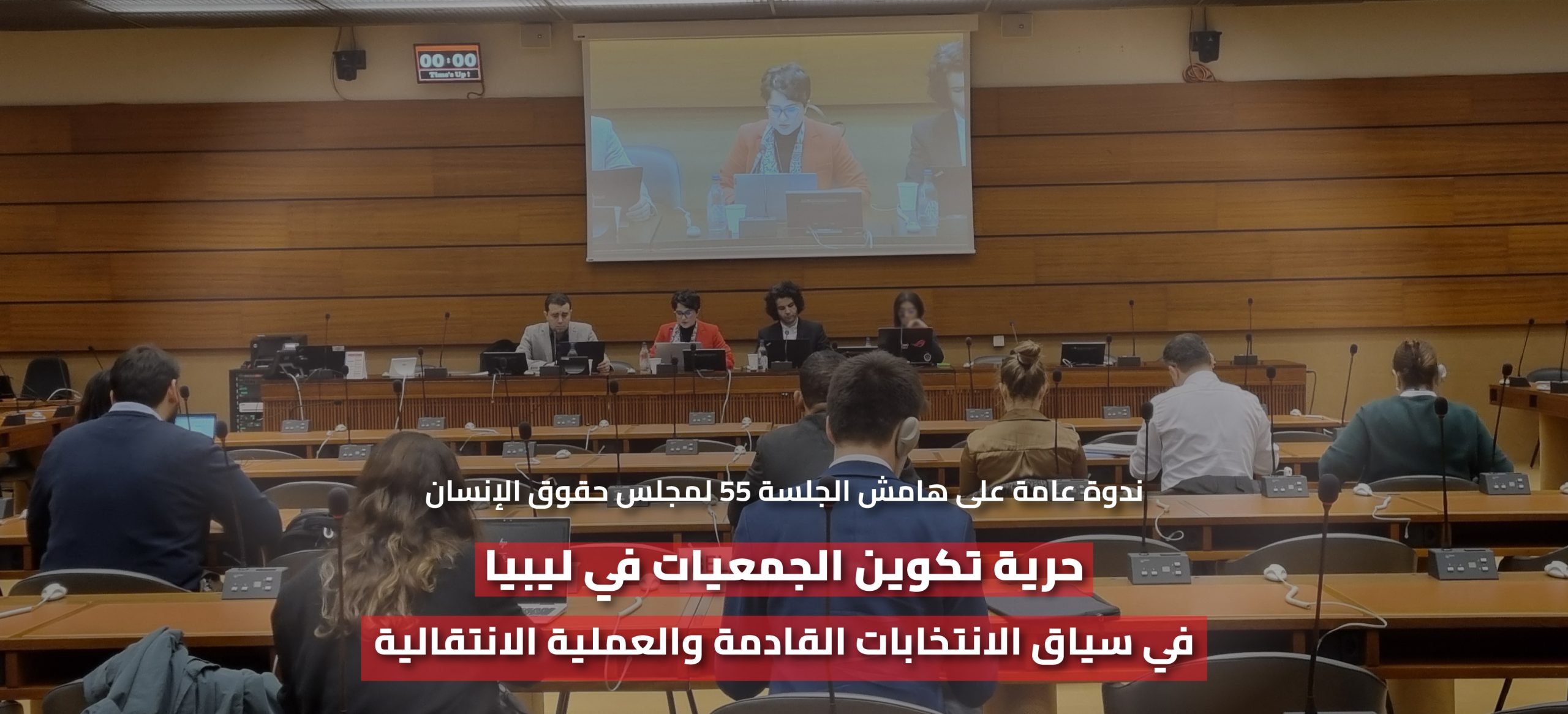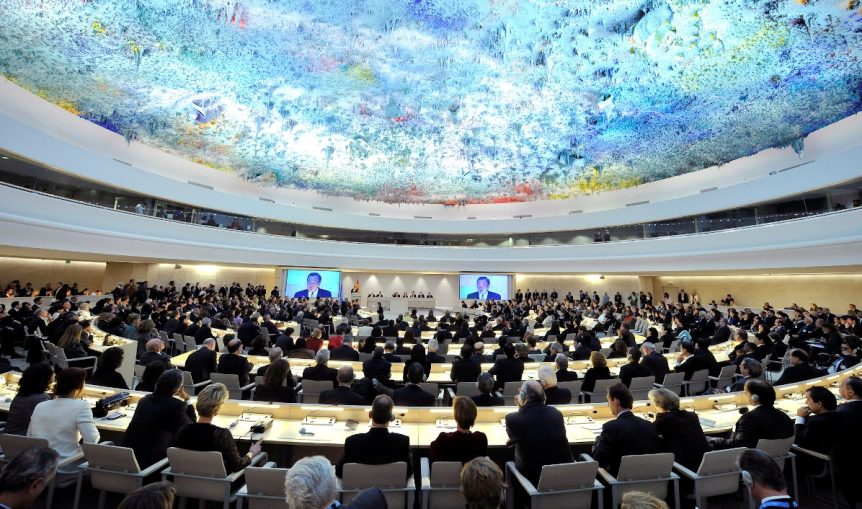On 5 April, the longest session in the history of the United Nations Human Rights Council came to an end. Over a six-week period, UN member states debated and voted on resolutions concerning human rights issues throughout the world, including most notably on Palestine and Ukraine. However, according to the Cairo Institute for Human Rights Studies (CIHRS), double-standards and silence concerning some of the world’s worst human rights crises is increasingly eroding the effectiveness and credibility of the Council.
Jeremie Smith, CIHRS’ Geneva Officer Director said, “Victims of rights violations and atrocities, particularly in the MENA region, are being abandoned or ignored at the Council en masse. We welcome the recent proliferation of multiple investigations on Russia and Ukraine, but these priorities should not be used to justify a refusal to protect other victims of human rights violations.”
In a joint statement at the end of the session, NGOs condemned the Council’s growing failure to protect victims throughout the MENA region, including in Algeria, Bahrain, Egypt, Libya, Saudi Arabia, and Yemen. The Libyan and Yemeni people continue to endure war crimes and crimes against humanity, while citizens throughout the region are “routinely subjected to brutal, wide-spread human rights violations intended to silence dissent, eradicate independent civil society and quash democratic social movements.” Over the last four years, the Council has discontinued war crime investigations on Yemen and Libya, while states have refused to follow-up on joint UN member-state declarations denouncing rights violations in Bahrain, Egypt and Saudi Arabia.
Despite the grave rights crises that prevail in most of the twenty-two member states of the League of Arab States, only two members are currently subjected to investigations at the Council: Syria and Sudan. However, there are fears that even these two investigations will soon be discontinued due to obstructionism and selectivity from member states of the Arab Group and OIC, and a decline in principled leadership at the Council.
Mr Smith continued, “The Council and UN member states must rise above narrow political agendas to address the selectivity and double-standards that increasingly characterises the Council’s approach. Failing to do so will only empower authoritarian governments in their efforts to tear down the UN human rights system.”
Also noticeably absent from this session’s deliberations were human rights violations committed by China. According to NGOs, the “sustained failure by Council Members, in particular the Organization of Islamic Conference countries, to promote accountability for crimes against humanity against Uyghurs and Muslim peoples in China severely undermines the Council’s integrity, and its ability to prevent and put an end to atrocity crimes globally.”
Resolutions and deliberations on both Palestine and Ukraine provided a defining theme throughout the 55th Session. An international investigation on Ukraine delivered a report highlighting war crimes and other violations carried out by Russia in Ukraine, including the forced transfer of children. A resolution to ensure the continuation of the investigation was adopted, with China, Eritrea and Burundi voting against the resolution.
The UN expert on the Occupied Palestinian Territory delivered a ground-breaking report that concluded Israel’s strategy of warfare against the besieged population of Gaza meets the legal threshold indicating the commission of genocide. Three resolutions were adopted on Palestine. In accordance with a recent order of the International Court of Justice, a resolution on “ensuring justice and accountability” included a call for states to cease the sale, transfer and diversion of arms, munitions and other military equipment and “duel-use” items to Israel if there are reasonable grounds to suspect they would be used in the commission of crimes. The resolution was adopted by a vote of 28 in favour, 13 abstentions and 6 votes against. The United States and Germany constituted the most active and vocal opposition to the resolution. Other states who voted against included Argentina, Bulgaria, Paraguay and Malawi. In a positive sign, three members of the Western Group of states voted in favor, including Belgium, Luxembourg and Finland.
In a press conference at the commencement of the 55th Session, CIHRS warned that double-standards on the issue of Ukraine and Palestine threaten to increase political polarisation, undermine the legitimacy of human rights initiatives, and could severely weaken the ability of the UN human rights system to adequately address critical human rights situations and thematic issues around the world. In a statement to the council, CIHRS highlighted the need to end all complicity and support for Israel’s indiscriminate targeting of the civilian population, its restrictions on humanitarian aid, the deliberate starvation of the displaced population, its displacement of entire communities, and its wanton destruction of vital infrastructure.
According to Mr. Smith, “This session we saw double standards on full display. It is encouraging that three European countries broke from the US and German positions to take a principled stand and support accountability for crimes committed by Israel. We urge other members of the Western Group to follow suit, and for all countries to immediately cease supplying weapons to Israel.”
The International Commission of Inquiry (COI) on Syria also presented its report at the Council. A resolution to renew the COI was adopted, ensuring that the COI would continue its critical role in pursuing accountability for war crimes and crimes against humanity by all parties to the conflict. The resolution also highlighted the need for states to support the work of the mandate of the Independent Institution on Missing Persons in Syria, a mechanism recently created by the UN General Assembly in response to calls by Syrian civil society.
In a statement to the Council, CIHRS, in partnership with Syrians for Truth and Justice, expressed deep concern about the escalation of hostilities across Syria and supported the COI’s demand for an urgent ceasefire. According to the statement, various parties to the conflict have taken advantage of a lack of sustained attention on the situation in Syria to commit further violations that may amount to war crimes, including Turkey. In this regard, the international community should move to adopt a more inclusive approach to justice and accountability for Syria.
Speaking on Egypt before the Council, CIHRS condemned the Council’s continued silence on widespread rights violations in the country, including the unprecedented crackdown on civil liberties, and the complete obliteration of political opposition through a surge in arbitrary detentions and death sentences, widespread torture that may amount to a crime against humanity, and routine practices of enforced disappearance and unending pretrial detention.
Also during the 55th Session, CIHRS joined a broad coalition of civil society in calling for mandates on Iran and South Sudan to be renewed. The Fact Finding Mission and Special Rapporteur on Iran were renewed, as well as the Commission of Human Rights on South Sudan. Other positive outcomes include the first ever resolution upholding the rights of intersex people, as well as resolutions on the prevention of genocide, and on the renewal of the mandate of the Special Rapporteur on the human right to a clean, healthy and sustainable environment, among others.
A resolution on freedom of religion or belief was also adopted. However, a parallel resolution on combating intolerance (widely known by its original name Resolution 16/18) was not tabled at the session. Since 2011, these two resolutions have been renewed simultaneously, representing a consensual framework to address the root causes of hate based on religion or belief. The failure to put the resolution on combating intolerance on the agenda may be due to efforts by the OIC to put forward an alternative framework on “combating religious hatred” at the end of last year. NGOs, including at this session, have written to states and intervened before the Council to warn that this initiative, as formulated by the OIC, attempts to insert “religious blasphemy” laws into the international human rights framework, thereby weakening universal standards, including on freedom of expression and freedom of religion.
The new Special Rapporteur on Counter-terrorism delivered a stark warning to the Council that “rampant abuse of counter-terrorism laws threaten human rights globally.” In response to the Special Rapporteur, CIHRS welcomed that the Middle East will be a geographical focus for his country visits and urged him also to focus on North Africa where patterns of violations in the context of counter-terrorism are similar and interrelated to those found in the Middle East. In Egypt and Algeria, these practices have been harnessed to silence large-scale social movements for democratic and economic reform and the term “counter-terrorism” has become a bi-word for brutal repression and the destruction of independent civil society.
CIHRS also intervened at the Council to call on the government of Libya to take urgent action to protect civil society, and to reiterate the need for both national and international forms of accountability for past and ongoing crimes against humanity, war crimes and other grave violations of international law in the country.
Earlier during the session, on 18 March, CIHRS, in cooperation with Libyan and international NGOs, held a UN event on Libya titled “Freedom of Association in Libya in the Context of Upcoming Elections: Safeguarding the Critical Role of Civil Society in Libya.” Libyan human rights defenders and representatives of civil society highlighted the repressive legal framework for civic space, and violent attacks against members of civil society – warning that such practices threaten the possibility of holding free and fair elections in the country. CIHRS called on the Libyan authorities to take urgent action to combat the repression of civil society, by enacting regulations and laws concerning freedom of association that conform to international standards as detailed in the letter addressed by the Special Rapporteur on Freedom of Association and Assembly and the Libyan constitutional declaration, and according to a road-map agreed to by members of the Libyan government during a roundtable hosted by the Special Rapporteur in Geneva on 6-7 February 2024.

Share this Post

